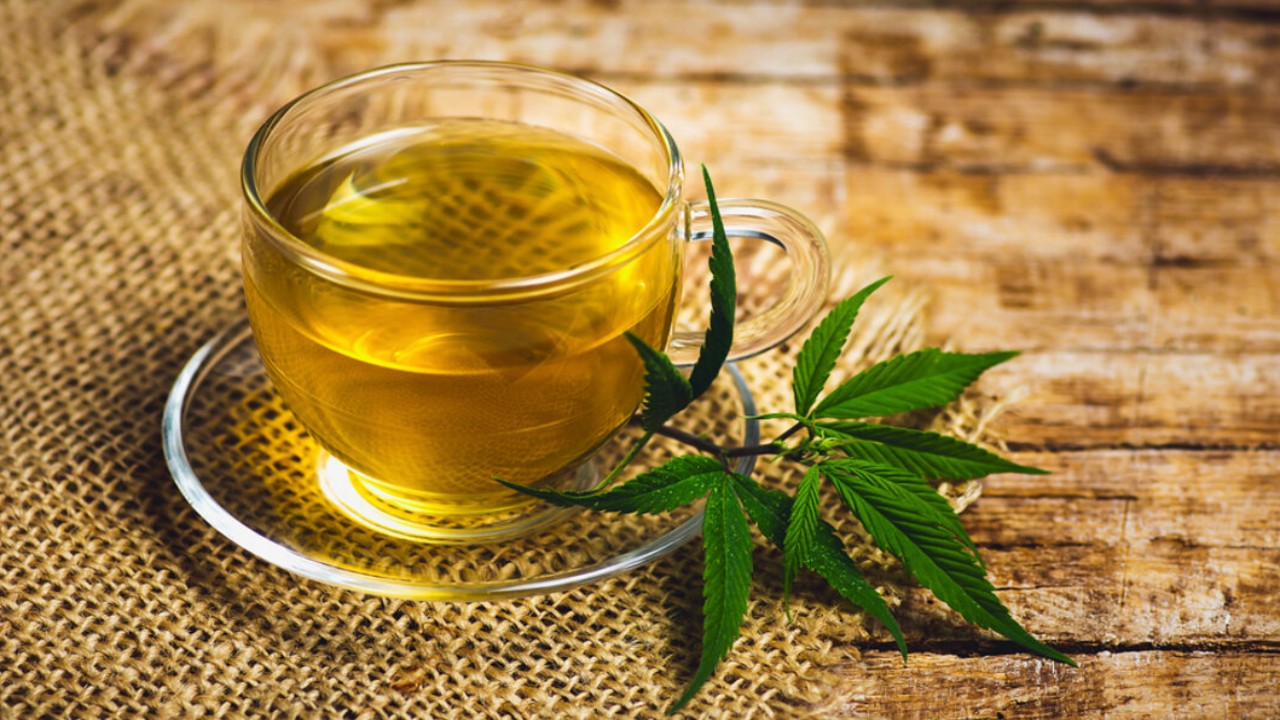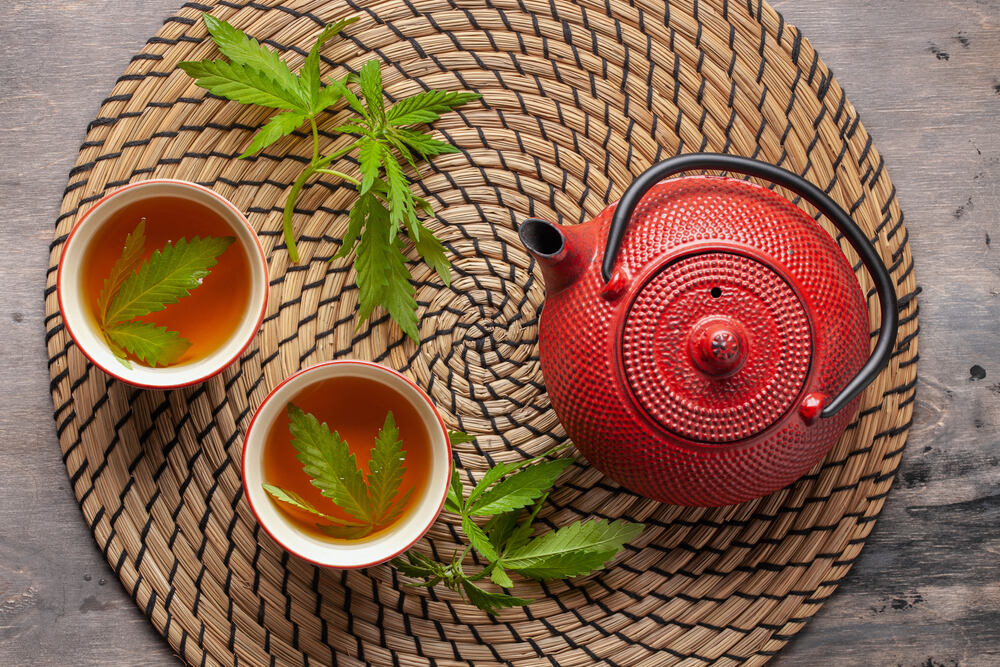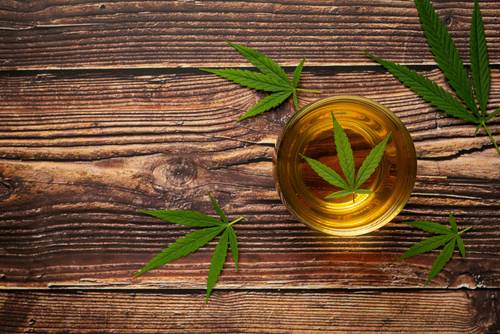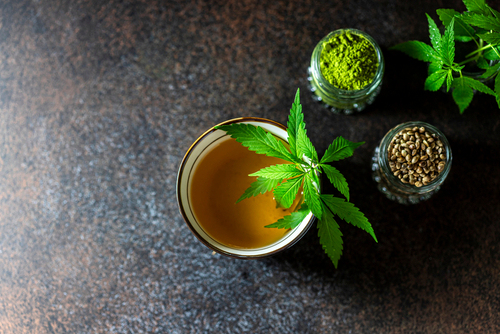How to Make Weed Tea at Home: 3 Easy Recipes You Must Try
Dive into the world of this cannabis-infused drink and unlock the therapeutic benefits of this herbal delight in easy steps. Here’s a guide on how to make weed tea.

With a variety of beverages available across the world, there emerges a unique concoction steeped in tradition and mystery — Cannabis tea. Whether it's for pain relief or sound sleep at night, one must know how to make weed tea in easy steps. It might seem like an art, one that resonates deeply with both history and modernity. Making a cup of weed tea is a fusion of nature's remarkable plant, cannabis, and traditional tea brewing. This isn't just a beverage; it's a journey.
Cannabis tea is unique. Often, people call it weed tea, pot tea, or ganja tea. It's a delightful drink made by mixing parts of the cannabis plant with water (1). This can be done with hot or cold water. Many know cannabis for recreational or health reasons. They think of smoking it or eating it. However, many don't know about its potential in tea form. Brewing this tea taps into the plant's healing qualities. The effects are influenced by its THC and CBD levels (1). Like other cannabis products, heat is crucial. It unveils the full range of its benefits. On the other hand, it is important to note that cannabis tea is a psychoactive drink. So, drinking in moderation is important depending on your health condition.
Yet, what sets cannabis leaf tea apart is its gentle nature. Unlike its potent counterparts, this tea focuses on wellness without the heady sensations typically linked to marijuana (1). Every sip offers a lot more than flavors, enveloping the drinker with relaxation, stress relief, and holistic well-being.
Our contributor Mary Sabat, RDN, LD, and Ace Certified Trainer, says, “Cannabis tea, often referred to as weed tea, may have the potential to relieve stress for some individuals due to the cannabinoids it contains, particularly CBD (cannabidiol). CBD is known for its potential to reduce anxiety and stress in some people. However, the effects can vary depending on the strain of cannabis used, the THC (tetrahydrocannabinol) content, and individual sensitivity. Cannabis tea may also have other potential healing qualities, as cannabinoids have been studied for their possible therapeutic properties, such as pain management and anti-inflammatory effects, but further research is needed to establish their efficacy and safety.”
Tea has always been a comforting elixir for many, calming the nerves and warming the soul. When infused with cannabis, the result is not only aromatic and soothing but also potentially therapeutic (2). With a surge in tea enthusiasts worldwide, the intrigue around cannabis-infused tea has grown, enticing both medical patients seeking relief and those desiring a unique, calming experience (2).
The Effects of Cannabis Tea

Cannabis tea, a traditional drink in many cultures, has gained significant attention in recent years for its potential health benefits. As more people become receptive to the wellness potential of cannabis, understanding its effects when consumed as tea becomes imperative.
- Promotes relaxation and reduces stress: The presence of cannabidiol (CBD) in cannabis leaves has shown potential in alleviating anxiety and inducing a sense of calm (3). When brewed into tea, this can provide a gentle means for users to combat daily stress and find tranquility.
- Aids in sleep regulation: Cannabis-infused tea can act as a natural sleep enhancer (3). CBD's properties help in calming the mind, making it easier to drift into sleep. For those struggling with insomnia, a cup of cannabis tea might help. (3).
- Supports digestive health: Cannabis tea can be beneficial for those with digestive issues. The inherent chemicals in the leaves can help regulate digestion, soothe inflammation, and provide relief from symptoms of disorders like IBS (4).
- Boosts the immune system: Rich in antioxidants, pot tea can fortify the body's defense mechanisms. The cannabinoids present in the leaves also have properties that can improve immune response (5).
- Anti-inflammatory properties: CBD, abundant in cannabis leaves, has garnered praise for its anti-inflammatory capabilities (6). This makes cannabis tea an ideal drink for those suffering from chronic inflammation.
- Supports cognitive function: Cannabis tea may also offer neuroprotective benefits. CBD's potential in safeguarding neurons can be particularly crucial in combating cognitive decline and conditions like Alzheimer's (7).
- Skin health and beauty: Beyond internal wellness, cannabis tea may also confer benefits for the skin. The anti-inflammatory and antioxidant qualities may reduce skin conditions like acne and eczema (6).
- Pain relief: The pain-relieving properties of cannabis make its tea a perfect option for pain management. Regular consumption might alleviate chronic pain conditions, reducing reliance on over-the-counter medications (8).
- Appetite regulation: Cannabis tea can also play a role in regulating appetite. CBD's interaction with the body's endocannabinoid system might help in modulating hunger cues (9).
- Mood enhancement: Lastly, a cup of weed tea might uplift spirits. The cannabis leaves can have mood-boosting effects that combat depression and anxiety symptoms (10).
Cannabis tea offers a holistic approach to well-being. Though there is research going on about the benefits, it's clear that this ancient drink holds relevance even in modern times, promising wellness in every sip.
Will Cannabis Tea Get You High?

The psychoactive potential of cannabis tea is a common concern. Cannabis tea can induce a high. However, the intensity largely depends on the cannabinoid profile of the tea and individual reactions. Typically, THC-infused teas are psychoactive, and their effects can be profound, lasting up to eight hours in some cases.
The method of consumption plays a crucial role. While smoking provides immediate effects, edibles and beverages like tea undergo digestion. THC gets converted to 11-hydroxy-THC in the liver. This is undoubtedly a more potent ingredient and has longer-lasting effects than THC.
How to Make a Weed Tea?
While brewing a pot of tea seems straightforward, when adding cannabis into the mix, there are a few essentials to bear in mind:
- Infusion methods matter: It's hard to beat the simplicity of simmering your cannabis buds, leaves, or stems for about 30 minutes to extract the plant's goodness.
- Plant parts influence potency: A weed tea brewed from the flower is typically more potent than one made from stems. Thus, choosing the right part is crucial.
- Don't forget the fat: To extract the cannabis efficiently, a fat source like butter or coconut oil is essential. This not only helps in the extraction process but can also influence the tea's effects and flavor.
- Determining the correct dosage: The therapeutic effects of cannabis tea depend significantly on its dosage. For instance, a gram of cannabis weighing about 1,000 mg contains a 10% THC content. So, to count it correctly, your brewed tea will contain around 100 mg of THC. However, the dosage is a more important factor than the THC content.
- Steeping matters: Just as with any tea, the longer you steep, the stronger the brew.
- Everyone's different: Each person's reaction to cannabis is unique. For first-timers, starting with a half-cup (125 ml) is advisable. Regular users might prefer starting with a cup (250 ml) and adjusting as needed.
- Decarboxylate your cannabis: Consuming raw cannabis might not yield the outcomes you anticipate. The compounds in the unprocessed plant, such as THCA, differ in effect from THC. However, when heated to approximately 105°C/221°F, THCA transforms into THC through a process known as decarboxylation.
- Milk or cream can enhance your brew: This isn't merely for flavor. A fat source like milk or cream can significantly boost the potency of your drink. Some studies even suggest that a weed milk tea with fat-based formulations could enhance cannabinoid absorption by up to 2.5 times.
- Patience is key: Once ingested, the impact of cannabis tea might take anywhere from 30 to 90 minutes to kick in. Factors like metabolism and body weight influence this variation. The sensations can persist for four to eight hours, so it's advisable to be in a relaxed environment when partaking.
3 Weed Tea Recipes to Try Out
1. Herbal Weed Tea
- Prep Time: 10-20 minutes
- Ingredients: Your chosen herbal tea, a fat source (like butter or coconut oil), ground cannabis, and water
- Steep Time: Three minutes
- Steps: Boil the water. Add your fat source and the ground cannabis. Let it simmer, strain the liquid, and steep your chosen herbal tea for 2 minutes.
2. Infused Golden Milk Tea
- Prep Time: 5 minutes
- Ingredients: Weed tea, weed-infused or plain coconut oil, unsweetened milk, spices like cinnamon, turmeric, and ginger
- Steep Time: 20 minutes
- Steps: Add the spices to the milk and bring to a low boil. Add weed tea and the coconut oil, simmer, and pour into your cup. Sweeten or spice it further to taste.
3. Weed Stem Tea
- Prep Time: 20-30 minutes
- Ingredients: Cannabis stems, water, and a fat source (optional for enhanced extraction)
- Steep Time: Around 5-10minutes
- Steps: Grind the stems (if preferred), boil the water, introduce the stems and fat, and let it simmer. Once done, strain and savor.
Cannabis-infused teas offer a symphony of flavors and therapeutic benefits. From relaxation to mood enhancement, these recipes will guide you through crafting the perfect brew.
Conclusion

Stepping into the world of herbal drinks, one finds a blend of tradition, wellness, and natural goodness. We have added 3 recipes along with detailed pointers and tips so you now know how to make weed tea like a pro. Infusing cannabis with water, we unlock a treasure trove of therapeutic benefits and flavorful experiences. This herbal brew, derived from ancient practices, offers a refreshing alternative to other modes of cannabis consumption. Each sip encapsulates the essence of nature and tradition. But one thing you must not forget is that every individual should only consume weed tea in moderation and consult with healthcare professionals for clarity of dosage.
As the world leans towards holistic wellness and natural remedies, cannabis tea holds a special spot in many hearts. Crafting this beverage not only revives age-old practices but also opens doors to a serene and healthful experience. So, as you wrap your fingers around a warm cup of weed tea, know that you're savoring a drink that has charmed many for generations, only when consumed in moderate quantity.
Contributor: Mary Sabat, RDN, LD, Ace Certified Trainer - Body Designs Ltd.





 JOIN OUR WHATSAPP CHANNEL
JOIN OUR WHATSAPP CHANNEL






















































